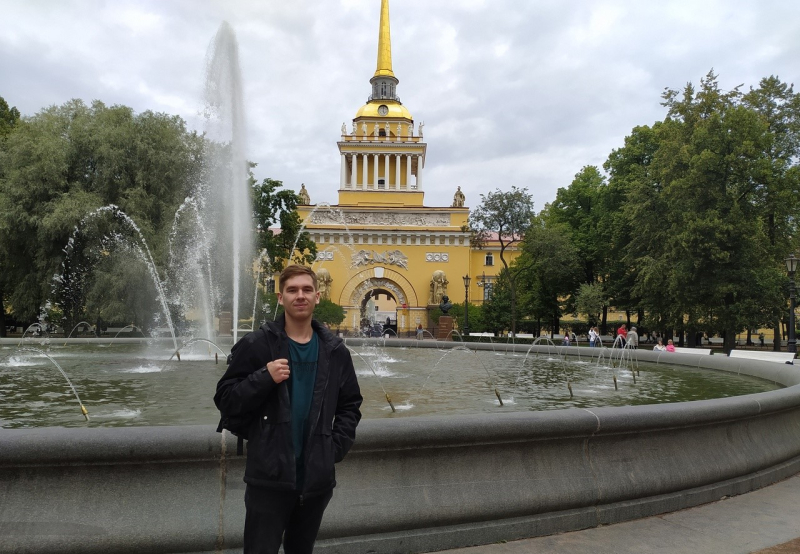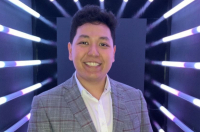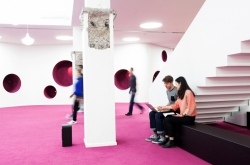Please introduce yourself to our readers.
My name is Alexander Saitov and I am a first year Master’s student in foodtech. I study food biotechnologies.
Where are you from?
I come from the town of Taldykorgan in Kazakhstan. I got my Bachelor’s degree in ecology and environmental management from Tomsk State University. There, as a fourth-year student, I learned about ITMO, so I passed the entrance exams for my Master’s program and came to ITMO to study.
What’s your hometown like?
Taldykorgan is a relatively small town, a two-hour drive away from Almaty. My favorite thing about it is that it’s very sunny, even though we sometimes experience drought in August, when the temperatures can reach 45 degrees Celsius! Also, you can take a 40-minute drive to the nearby Tekeli, a town at the foot of the mountains with breathtaking views.
Do you have a favorite holiday or tradition of your country?
Muslim holidays are widely celebrated in Kazakhstan and even though my family has a different religion, we always congratulate our friends and neighbors. In return, they share treats, because it’s traditional to share meals with those close to you. I find this a wholesome tradition.
Are there some Kazakh meals that you miss in Russia?
I miss a lot of them – in particular, I am craving some beshbarmak and manti. Something similar to manti can be found in other cuisines, but with beshbarmak I can only try and cook it myself. That’s actually my plan for the winter holidays: cook beshbarmak for my Russian friends and thus share my culture with them.
Sounds wonderful! I think you might like ITMO’s Buddy System student club – they organize nationality nights, where students from different countries talk about their cultures.
Thank you, that sounds interesting! I will look into them.
Do you have some tips on how to make friends in a new country?
Actually, I used to worry that it would be problematic, because as you get older, you don’t make friends with people quite as easily. I found that the most crucial thing here is to be yourself. If you don’t make yourself into someone you aren’t, it’s easier for people to talk to you. They see who you are and make their conclusions: do they like this person? If they like you, they will keep up the conversation. And if they don’t – then you most likely won’t enjoy spending time with these people as well.
How did you decide to study abroad and why did you choose Russia as your destination?
I was training for my university entrance exams at a study center, which was visited by representatives of different Russian universities, mainly from Tomsk, Novosibirsk, and Barnaul. The Novosibirsk universities focused mainly on physics, and I liked biology, so I was looking for opportunities within this subject. Eventually, I chose Tomsk for a variety of reasons, including the fact that my aunt studied and now lives there – my family and I decided that it would be great to live in the same city as a relative, who would be able to help me.
How did you learn about ITMO?
My friend told me about it. He said that at ITMO, you can study biotechnologies and the related Master’s programs offer many tuition-free positions. From him, I also learned that you can prepare for the entrance exam in advance, because the list of key questions is available on the website. I got interested and started training for the exam.
I felt that the exam itself was relatively easy. I also got lucky – I had a question on acidic environments; I had worked with them before, so I had a lot to tell the examiners.
What do you think of St. Petersburg?
When I first came here, I was amazed by the city’s beauty – its drawbridges, its architecture, and the Gulf of Finland. I also find it very convenient, because you can get anywhere on the metro. So far, I have also had the chance to visit some of the city’s famous suburbs: Kronstadt, Sestroretsk, and Peterhof. Next on my list is the nearby Vyborg.
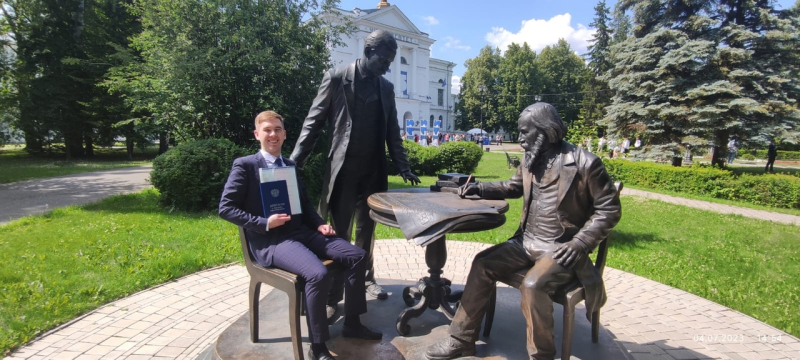
Photo courtesy of the subject
I hope you enjoy your trip there! Let’s talk about academics. How did you get into your field of studies?
Initially, for my Bachelor’s degree at Tomsk State University, I was looking to study at the Faculty of Chemistry, but I didn’t get enough points. That’s why I ended up studying my second choice, biology. Until then, I hadn’t known just how much I liked this subject. Then, as I was doing my Bachelor’s degree, I learned about the field of biotechnologies and the promise it holds – it’s actually a very advanced science that brings the future closer. When I was applying to ITMO, I was at first interested in industrial biotechnology, but my placing in the ranking of applicants landed me in food biotechnology. I now believe that it’s a very lucky coincidence because I can truly see myself excelling in this field more.
Why? What would you like to do after graduation?
I would like to do something connected to the production of alcohol. I accidentally got interested in it in 10th grade: I wanted to make berry kvas, but it fermented too much and turned into wine. That’s how I got into the process; I started making other products, too, and people liked them. So I thought, why not do this?
Recently, I went to a meeting of the ITMO Negotiations student club. There, the speaker was asked a good question: how do you find your calling? His answer was based on my example: if you can do every step necessary to produce wine – from picking the berries and pressing them to fermentation and the final bottle – and it’s not a burdening task for you, then there is a 99% chance that this is what you should be doing. That’s how I understood what I want to do in life.
What a beautiful story! It’s great that you not only know about our student clubs, but have even found some insights at the meetings. How do you like the various extracurricular activities available at ITMO?
The student life here is bustling – there are so many student clubs and potential hobbies you can pick up! It’s also very handy that you can learn about all these clubs in the my.itmo app. For instance, I learned about the ITMO Negotiations club because I received an email notification about it. I am also planning to attend more of their meetings when my classes get a little less intense.
What do you think about the academic process at ITMO?
At first, it wasn’t easy for me to get the hang of the module-based system – I was used to the standard one: first, you spend a semester studying several subjects at once and then come the sleepless nights of the exam period. Then I learned that modules are actually rather convenient. You get to delve into one subject, with no need to switch between different disciplines. Once the module is complete, you have a good command of its contents, so you can rely on this knowledge in the next module.
What about the administrative processes at the university? Did you get the chance to interact with the International Office and the Student Services Office?
Yes. The staff of the International Office is very friendly and always explain everything in detail; if you have a problem, they will always try to help you. The same goes for the Student Services Office – they helped me get my student travel card by fixing some issue with my page on ISU (the university's digital information system – Ed.). I find it convenient that there is such a clear system and you don’t need to worry about which room you need: there are just two offices and each of them has people ready to help you.
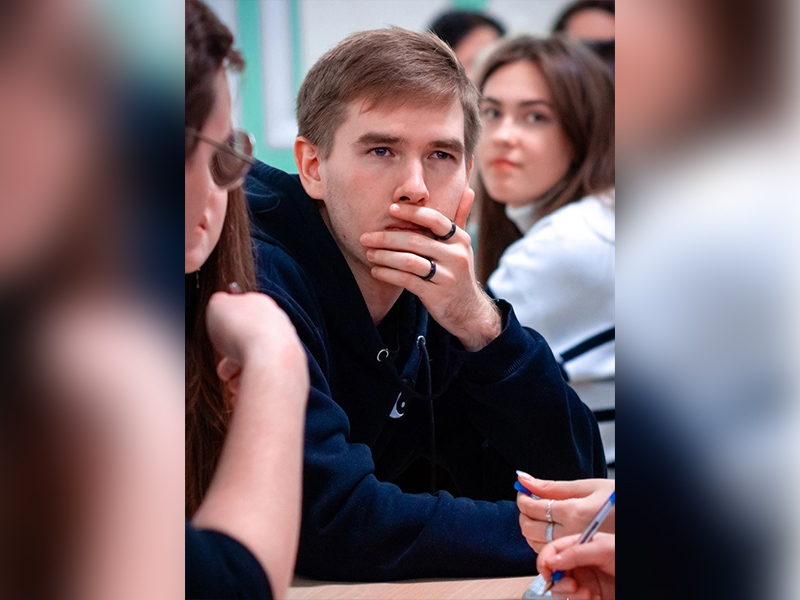
Alexander loves the opportunities provided by student clubs at ITMO. Photo courtesy of the subject
Are you staying at an ITMO dormitory? Do you like it there?
Yes, I live in the dorm on Belorusskaya St. I think it’s wonderful, I am fully content there. My roommate is from Morocco, so I also get to engage in cultural exchange with him. I think it’s one of the best opportunities offered to me at ITMO! We don’t speak each other’s languages, so we practice our English, sharing stories about our home countries.
What are your hobbies?
I’ve recently visited a festival of books about art and discovered one great hobby – art. I’ve bought some books on the topic and spend my free time reading them. I am making a list of all the museums and churches I have to visit here.
I wish you luck with your cultural discoveries! Do you have any advice for students applying to ITMO University?
If you want to study well for the entrance exam, then try not to learn the answers by heart, but truly understand them. At the exam, you might be asked something slightly different to see if you know what you are talking about – and in the worst-case scenario, you won’t be able to answer.
For such in-depth knowledge and understanding, I think YouTube is a great platform. There, for instance, you can find lots of great videos on industrial biotechnology, from DNA sequencing to Nobel-winning studies. What’s more, there are both lengthy 1.5-hour lectures and short 5-minute rundowns.
